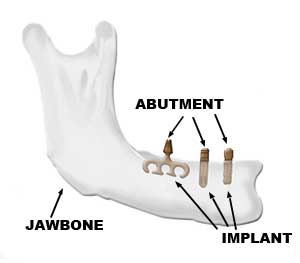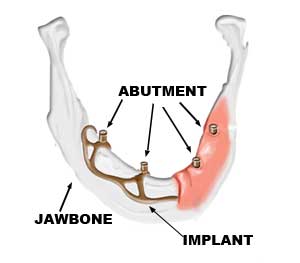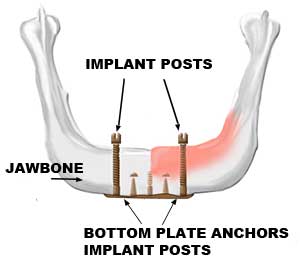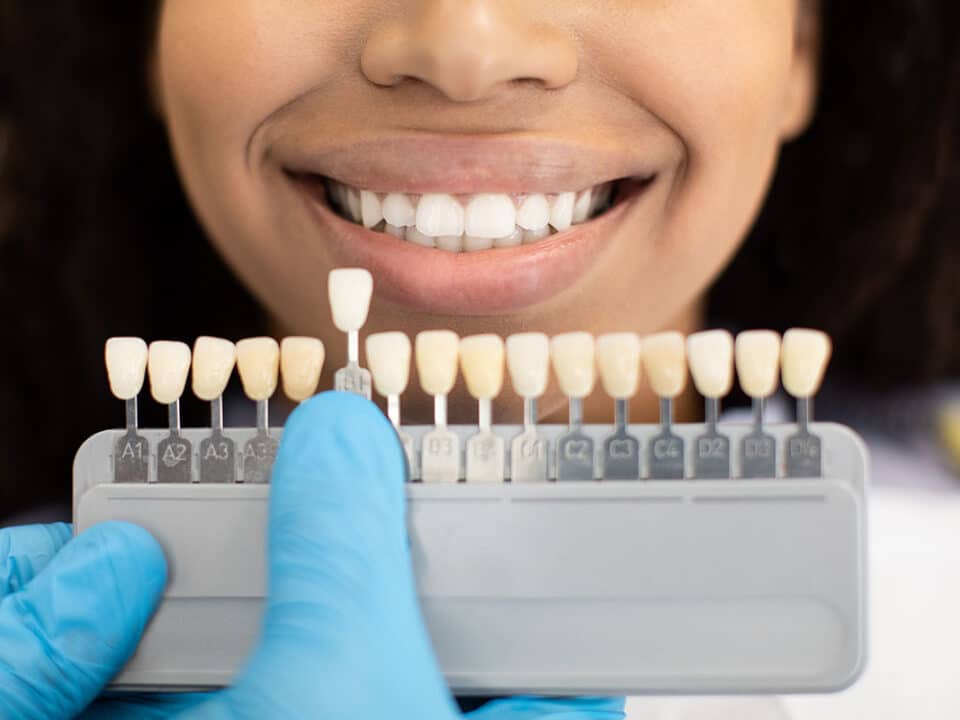If your smile is missing one or more teeth, then chances are your dentist will have recommended having them replaced. The aesthetic appeal, not to mention the function of your smile, is greatly affected without a full set of pearly whites – which is why tooth replacement is one of the most common aspects of modern cosmetic and restorative dentistry. That’s also why you’ll likely have considered your options, among which are dental implants. To help you learn more about this effective procedure, we’ve put together this article, “Dental Implants: All the Things You Need to Know.” Keep reading.
Table of Contents
What are dental implants?
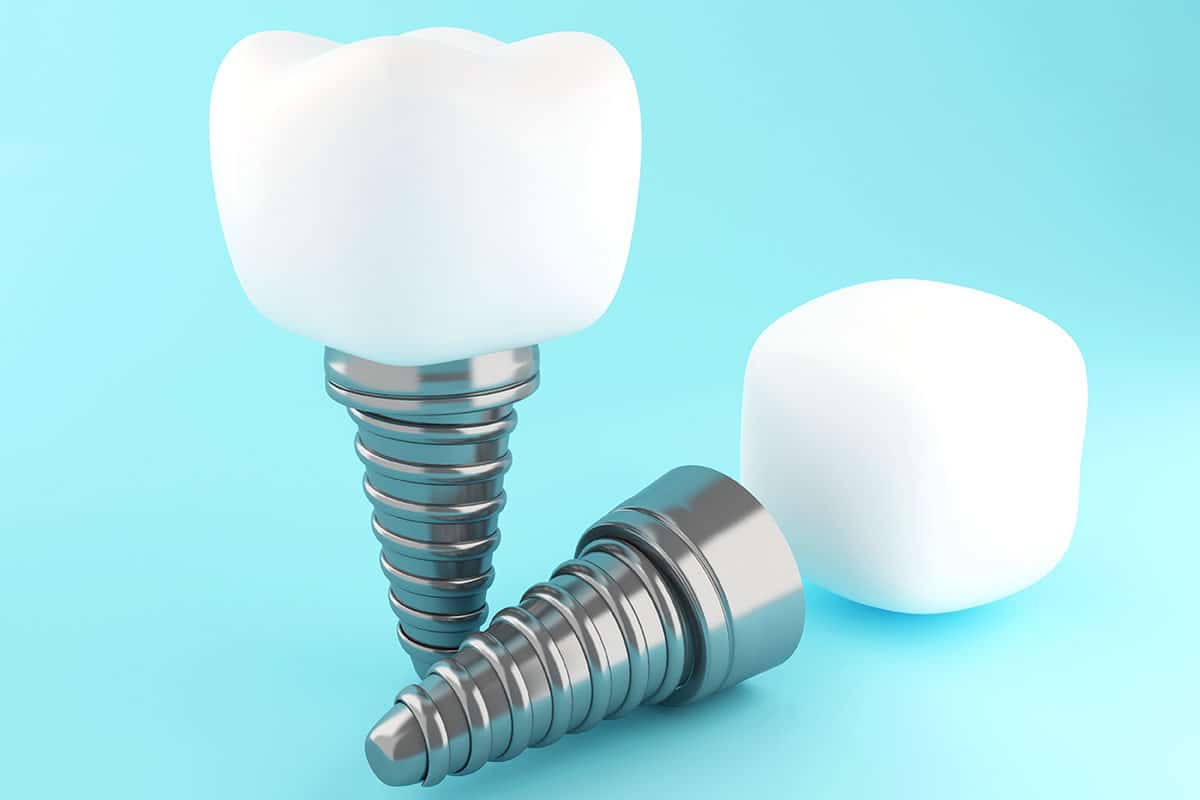
Dental implants are artificial tooth roots that are used to replace missing teeth. They are designed to provide a strong foundation for prosthetic teeth that function and look like natural teeth. Dental implants are typically made of biocompatible materials, such as titanium, and are surgically placed into the jawbone.
Dental implants offer several advantages over other tooth replacement options, such as dentures or bridges. They provide better stability and function, allowing individuals to eat and speak easily. Implants also help preserve the jawbone’s integrity by stimulating natural bone growth, preventing bone loss commonly occurring when teeth are missing. Furthermore, dental implants are long-lasting and can last a lifetime with proper care and maintenance.
It’s important to note that the dental implant process requires careful planning and should be performed by a trained dental professional, such as a prosthodontist or oral surgeon. They will assess your situation and determine if dental implants are the most suitable option.
Are tooth implants the same as dental implants?
Yes, dental implants and tooth implants are essentially the same thing. The terms “dental implants” and “tooth implants” are often used interchangeably to refer to the artificial tooth roots that are surgically placed into the jawbone to replace missing teeth. Whether you or your dentist refers to them as dental implants or tooth implants, they represent the same concept and procedure.
How do dental implants work?
The dental implant procedure involves several steps. First, a thorough examination and evaluation of the patient’s oral health are conducted to determine if they are a suitable candidate for dental implants. The implant placement can proceed with sufficient bone density and healthy gums.
During the surgical procedure, the dentist or oral surgeon carefully places the implant into the jawbone, often using local anesthesia or sedation to ensure patient comfort. Over time, the bone will heal and fuse with the implant, a process called osseointegration, which provides stability and support for the prosthetic tooth.
After the healing period, an abutment is attached to the implant, which connects the implant and the replacement tooth. The dentist will then create a custom-made crown, bridge, or denture to fit onto the abutment, matching the colour and shape of the natural teeth for a seamless appearance.
Required steps in a dental implant procedure
The dental implant procedure typically involves the following steps:
1. Initial Consultation
You discuss your dental health, medical history, and treatment goals with your dentist. They examine your mouth, take X-rays, and determine if you’re a suitable candidate for dental implants.
2. Treatment Planning
Your dentist creates a customized treatment plan based on your specific needs. This includes determining the number of implants required and the placement strategy.
3. Tooth Extraction (if necessary)
If there is a damaged or decayed tooth at the implant site, it may need to be extracted before the implant procedure. Tooth extractions are commonly associated with dental implants.
4. Jawbone Preparation
In some cases, if the jawbone lacks sufficient density or volume, a bone grafting procedure may be necessary to augment the area and ensure a stable foundation for the implant.
5. Implant Placement
The dentist surgically places the dental implant into the jawbone. This involves making an incision in the gum tissue, drilling a hole in the jawbone, and carefully inserting the implant. The gum is then sutured to promote healing.
6. Osseointegration
Over the next several months, osseointegration occurs, where the implant fuses with the surrounding jawbone. This process ensures stability and strength.
7. Abutment Placement
Once the implant has integrated with the jawbone, a small connector called an abutment is attached. The abutment serves as a connection point for the artificial tooth or crown.
8. Restoration Placement
Finally, a custom-made artificial tooth or crown is placed onto the abutment. This restoration is designed to match the colour, shape, and size of your natural teeth, providing a functional and aesthetically pleasing result.
Throughout the process, your dentist will guide you, monitor your healing progress, and provide aftercare instructions to ensure successful implant integration and long-term oral health.
When are dental implants required?

In short, dental implants will become a replacement option if a patient is missing a tooth or multiple teeth. There are various reasons why individuals may require dental implants, including:
Missing teeth
Dental implants are an excellent solution for individuals with one or more missing teeth. Implants can replace the missing teeth restoring the appearance and functionality of the smile.
Tooth decay or damage
Severe tooth decay or damage that cannot be effectively treated with dental fillings, crowns, or other restorative treatments may require tooth extraction. Dental implants can replace the extracted tooth and restore oral function in such cases.
Periodontal disease
Advanced gum disease can lead to tooth loss as it affects the supporting structures of the teeth, including the gums and jawbone. Dental implants can be a viable option to replace lost teeth and improve oral health.
Traumatic injury
Accidents or injuries to the mouth can result in tooth loss. Dental implants offer a long-term solution for replacing missing teeth, improving both the aesthetics and functionality of the mouth.
Previous dental work
Dental treatments like bridges or dentures may sometimes fail or become worn out over time. Dental implants can provide a more durable and reliable alternative to replace previous dental work.
Enhanced denture stability
Dental implants can be used to stabilize the dentures for individuals who wear removable dentures. Implant-supported dentures provide better stability and prevent slippage, enhancing chewing and speaking abilities.
Preserve jawbone health
When a tooth is lost, the underlying jawbone can deteriorate due to the lack of stimulation. Dental implants act as artificial tooth roots, stimulating the jawbone and preventing bone loss, preserving oral health and facial structure.
Types of dental implants
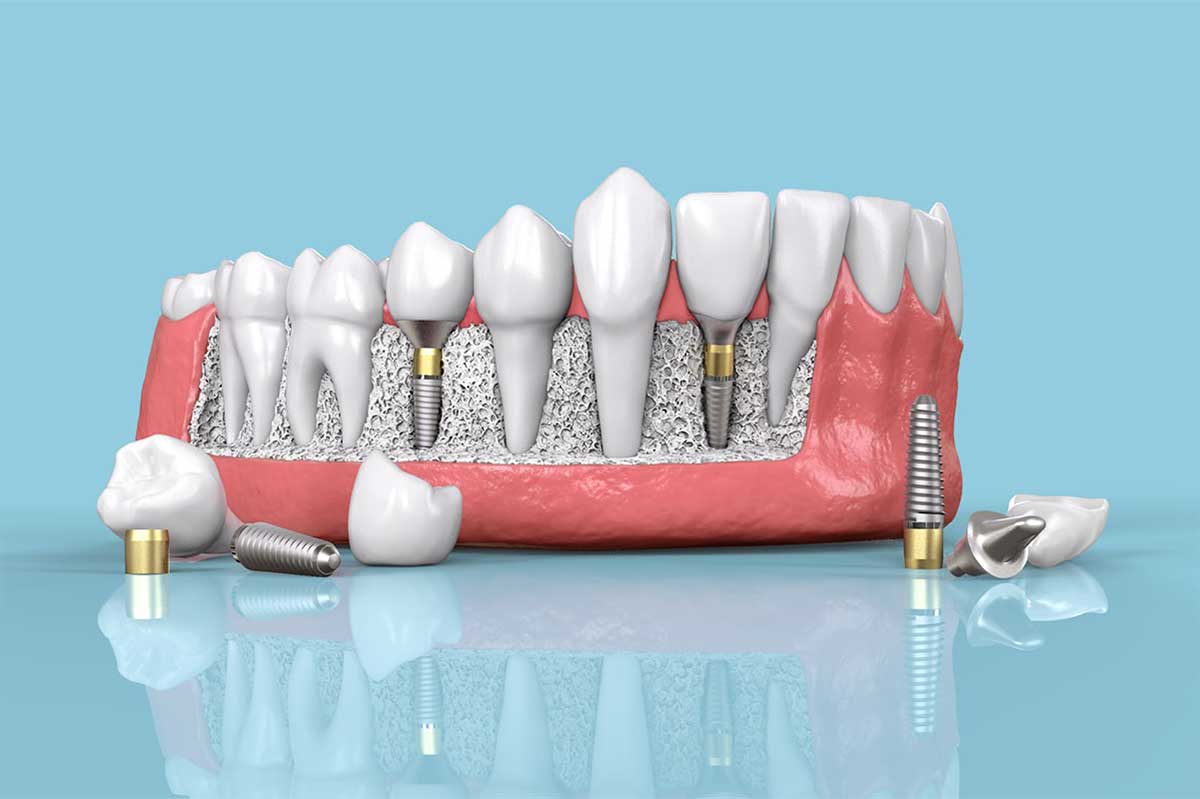
Two primary types of dental implants are commonly used by dentists worldwide: endosteal and subperiosteal, along with single-stage and two-stage procedures. Each option offers remarkably natural aesthetics, while each serves a unique purpose. After your dentist examines your mouth, they will be able to determine which option best aligns with your oral requirements.
Single-stage dental implant
A single-stage dental implant inserts a longer implant into the jaw and gum, exposing the top. After healing, the connector and crown are directly attached to the implant. This procedure is ideal for patients with bone issues or special needs, as it offers a faster process and smoother transition to new teeth after the initial surgery. This type of implant generally only requires one appointment with an oral surgeon.
Two-stage dental implant
The two-stage dental implant procedure involves multiple surgeries and healing periods, making it lengthier than the single-stage approach. Initially, the dentist surgically places the implant base in the jawbone, allowing it to heal. After a few months, a minor surgery exposes the base so that a connector and crown can be securely attached. The two-stage process is more invasive, but it offers long-term advantages. During the healing period between surgeries, the implant base fuses with the jawbone, providing a robust foundation comparable to a natural tooth root.
Endosteal implants
Endosteal implants are the preferred and more prevalent type of dental implant. They resemble small screws securely anchored into the jawbone, serving as artificial tooth roots. Dentists opt for endosteal implants to prevent bone loss, minimize shifting and to maintain the integrity of the face and jawbone structure caused by missing teeth.
Subperiosteal implants
Subperiosteal implants resemble endosteal implants in appearance but are instead positioned either under the gum tissue or on the jawbone’s surface rather than being anchored within it. This option is suitable for patients with inadequate or compromised jawbone strength. Dentists may recommend bone augmentation for endosteal implants when the jawbone needs reinforcement. However, patients who prefer to avoid bone augmentation can attain comparable outcomes through subperiosteal implants.
Transosteal implants
Transosteal implants are specifically designed for the lower jawbone and are not typically recommended due to the complexity of the surgical procedure involved. The placement of these implants entails securing a metal plate underneath the jawbone using screws that pass through the bone while the posts are embedded within the gum tissue.
Why are most dental implants made out of titanium?
If you’ve researched the treatment, you’ll likely have noticed that most dental implants are made of titanium or titanium alloy. Titanium is widely used in dental implantology due to its excellent biocompatibility and ability to fuse with the surrounding bone. This process, known as osseointegration, allows the dental implant to become securely integrated into the jawbone, providing stability and support for the replacement tooth.
Titanium is highly corrosion-resistant, lightweight, and strong, making it an ideal material for dental implants. It has been extensively researched and proven to be safe and effective for long-term use in dental implant procedures. Additionally, titanium’s biocompatibility ensures that it does not cause adverse reactions or rejection by the body.
Zirconia dental implants
While titanium is the most commonly used material, alternative implant materials, such as zirconia, are available. Zirconia implants offer tooth-coloured aesthetics and are often used in cases where a patient prefers a metal-free option (metal allergies) or has specific esthetic requirements. Zirconia is also bio-compatible and will fuse to the jawbone similarly to titanium.
Other types of tooth replacement options
Modern dentistry offers several types of tooth replacement options, depending on an individual’s specific needs and preferences. The choice of tooth replacement option depends on various factors, such as the number of missing teeth, oral health condition, bone density, budget, and personal preferences. Many patients will have the option to choose which method they use. Still, it is essential to consult with a dental professional who can evaluate your situation and recommend the most suitable tooth replacement option. Here are some common types of tooth replacement:
Dentures
Dentures are removable prosthetic devices that replace multiple missing teeth or a full arch of teeth. They are typically made of acrylic or a combination of acrylic and metal. Dentures can be complete (replacing all teeth) or partial (replacing some teeth). They are custom-made to fit the individual’s mouth and restore the appearance and functionality of the teeth.
Dental bridges
Bridges are fixed restorations that replace one or more missing teeth. They consist of artificial teeth (pontics) anchored to adjacent natural teeth or dental implants. The supporting teeth or implants are abutments to hold the bridge in place. Dental bridges are cemented or bonded onto supporting structures, offering stability and functionality.
Resin-bonded bridges
Also known as Maryland bridges, resin-bonded bridges replace missing front teeth. They consist of artificial teeth attached to metal or porcelain wings bonded to the adjacent natural teeth using dental adhesive. This type of bridge is minimally invasive and does not require extensive tooth preparation.
Removable partial dentures
These dentures are similar to traditional dentures but are designed to replace multiple missing teeth when natural teeth remain in the mouth. They have clasps or attachments that grip onto the remaining teeth for stability. Partial dentures that are removable can be taken out for cleaning and are an option when dental implants or bridges are not feasible.
Permanent dental implants
Dental implants are artificial tooth roots made of biocompatible materials, such as titanium, surgically placed into the jawbone. They provide a stable foundation for attaching a crown, bridge, or denture, resulting in a natural-looking and functional replacement tooth. Dental implants offer excellent stability, durability, and long-term benefits.
Advantages of dental implants

1. Enhanced functionality
Dental implants provide excellent stability and functionality, allowing individuals to bite, chew, and speak naturally without concerns of slippage or discomfort.
2. Improved aesthetics
Implants closely resemble natural teeth in appearance. They are customized to match the surrounding teeth’ colour, shape, and size, resulting in a seamless and attractive smile.
3. Longevity
Dental implants can last a lifetime with proper care, making them a durable and long-term tooth replacement option.
4. Bone health preservation
By integrating with the jawbone through osseointegration, dental implants stimulate bone growth and help maintain the jawbone’s integrity. This prevents bone loss, preserves facial structure, and supports oral health.
5. Convenience
Unlike removable dentures, dental implants eliminate the need for adhesives or special cleaning routines. They are cared for like natural teeth, providing a hassle-free and convenient solution.
Disadvantages of dental implants

1. Surgical procedure
The placement of dental implants involves a surgical procedure, which may require anesthesia or sedation. This can increase the overall cost and potential discomfort associated with the treatment.
2. Time-consuming process
The dental implant process typically involves multiple stages, including a healing period for osseointegration. It can take several months to complete the entire treatment, which may be longer than other tooth replacement options.
3. Cost
Dental implants tend to be more expensive than alternatives like dentures or bridges. The costs can vary based on factors like the number of implants required, additional procedures, and the location of the dental practice.
4. Potential complications
While rare, complications can occur with dental implants, such as infection, nerve damage, or implant failure. Choosing an experienced dental professional and following post-operative care instructions can help minimize these risks.
5. Requirement of adequate bone density
Successful implant placement requires sufficient bone density in the jaw. If the jawbone has experienced significant deterioration, bone grafting or other procedures may be necessary to augment the bone before implant placement.
How much are dental implants?

One of the most common questions patients ask about the procedure is, “How much do dental implants cost?”. The cost of dental implants can vary and takes several factors into account, including the number of implants planned, the complexity of the case, the location of the dental practice, the qualifications and expertise of the dentist or surgeon, as well as any additional procedures required. It is important to note that the following estimates are general ranges, and actual costs can differ.
On average, the cost of a single dental implant, including the implant fixture, abutment, and crown, can range from $1,500 to $6,000. However, this cost can increase if additional procedures, such as bone grafting or sinus lifts, are required to ensure the success of the implant.
It’s important to consider that dental implant costs may be broken down into separate components, including the initial consultation, diagnostic imaging (such as X-rays or CT scans), implant surgery, the cost of the implant components, and the final restoration (crown, bridge, or denture).
To get a more accurate idea of the average cost of dental implants, please contact our office or schedule a consultation appointment.
Does insurance cover dental implants?
In Ontario, Canada, dental implant coverage through insurance plans can vary. Typically, dental insurance plans in Canada cover a portion of the cost of dental procedures, including implants, up to a certain limit. However, it’s important to note that not all dental insurance plans cover dental implants and coverage limits and criteria may vary between different insurance providers and specific policies. It’s best to get in touch with our office to discuss your dental insurance options or reach out to your provider directly.
Are there any requirements for dental implants?
Several dental implant requirements should be considered when determining if a person is a suitable candidate for dental implants. These requirements typically include:
1. Adequate jawbone density
Sufficient jawbone density is necessary to support and stabilize dental implants. The jawbone must have enough volume and strength to withstand the implant placement and properly integrate with the implants during osseointegration. In cases where the jawbone has insufficient density, bone grafting or other augmentation procedures may be necessary to improve bone quality before implant placement.
2. Adequate oral health conditions
A healthy oral environment is crucial for the success of dental implants. The patient should have good oral hygiene practices, with healthy gums and no active gum disease (periodontitis). Any dental issues, such as decay or infections, should be addressed before implant placement to minimize the risk of complications.
3. Overall health assessment
The patient’s overall health is an important factor in determining implant candidacy. Chronic medical conditions, such as diabetes that is uncontrolled or autoimmune disorders may affect the success of implant treatment. A comprehensive medical evaluation is typically conducted to assess the patient’s suitability for the procedure.
4. Non-smoker or willingness to quit
Smoking can negatively impact the success of dental implants as it hampers the healing process and increases the risk of complications. Smoking patients may be required to quit or significantly reduce smoking to improve their chances of successful implant integration.
5. Commitment to oral hygiene and maintenance
Proper oral hygiene practices are essential for the long-term success of a dental implant procedure. Patients must be willing to maintain good oral hygiene habits, including regular brushing, flossing, and attending routine dental check-ups. They should also follow any specific post-operative care instructions their dental professional provides.
Each patient’s case is unique, and a thorough evaluation is necessary to determine the specific requirements and suitability for dental implants. A comprehensive examination, including dental and medical history, X-rays, and potentially CT scans, will be conducted to assess the patient’s circumstances and develop a personalized treatment plan.
Dental implant pre-surgery care instructions

While the dental implant procedure is common and straightforward, it is an invasive process that patients should properly prepare for using the following recommendations:
- Maintain good oral hygiene practices to minimize the presence of bacteria that could lead to gum infections following the surgery.
- Cease alcohol and tobacco consumption at least two weeks before surgery to minimize post-surgery complications and promote optimal healing.
- Inform your doctor about your medications to enable precautionary measures and reduce potential risks.
- Arrange transportation to and from the hospital, as driving may not be safe immediately after the procedure.
- Prepare for the recovery phase by gathering necessary items that may be needed during that period.
Post-surgery care for dental implants
- Manage any discomfort with over-the-counter pain relievers.
- Apply intermittent ice packs during the initial 24 hours to reduce swelling.
- Take the full course of prescribed antibiotics to prevent infections.
- Stick to soft oral surgery friendly foods to avoid disturbing the surgical area.
- Avoid hot drinks and spicy foods for a few days.
- Refrain from biting hard substances near the implant until fully recovered.
- Clean your teeth carefully using a Q-tip and suitable cleaning solutions, avoiding a toothbrush. Flushing gently with water can be beneficial.
- Avoid strenuous activities for a period following the surgery.
- Abstain from smoking for at least two weeks after the procedure.
- Consider using a bite guard to protect the implant site from trauma.
- Schedule regular checkups and follow-up visits with your dentist.
What are the best dental implants?

This is a difficult question to answer. When determining the best dental implants, several reputable implant manufacturers produce high-quality products. These companies invest heavily in research, development, and innovation to provide reliable and effective dental implants.
It’s important to note that selecting the best dental implant ultimately depends on various factors, including the patient’s specific needs, the dental professional’s expertise, and the individual case requirements. More importantly, a qualified dentist or oral surgeon evaluates your unique situation and recommends the most appropriate implant system based on bone quality, aesthetics, functionality, and long-term success rates.
Choosing an experienced dental implant specialist who works with reputable implant systems and follows established protocols for implant placement is key to achieving successful outcomes with dental implants.
Are there any bad dental implants?
As far as the physical dental implants themselves go, there shouldn’t be any issues regarding quality, provided you are having the procedure performed at a certified and reputable dental clinic. In this case, the things that can go wrong with dental implants typically concern the dentist or oral surgeon performing the tooth implant procedure. Dental implants have a high success rate and are considered a reliable and effective tooth replacement option; there can be instances where complications or failures occur. However, it’s important to note that such cases are relatively rare.
What are the most common problems with dental implants
While most dental implant procedures are successful, some potential issues with dental implants can occur. These include:
1. Implant failure
Dental implant failure can occur if the implant does not integrate properly with the jawbone (osseointegration) or becomes loose over time. Various factors, including poor oral hygiene, smoking, certain medical conditions, inadequate bone density, or improper surgical technique, can cause this. Implants can also fracture and wear out over time, usually caused by excessive clenching or grinding.
2. Infection
Infections around dental implants can develop, although this is uncommon. It usually happens due to poor oral hygiene or complications during healing. Infections, if left untreated, can lead to implant failure.
3. Nerve or tissue damage
During the implant placement, there is a small risk of nerve or tissue damage in the surrounding area. This can result in numbness, tingling, or pain in the lips, gums, tongue, or chin. However, this type of complication is rare and typically temporary.
4. Allergic reactions
Some patients may experience an allergic reaction to the implant materials. Your dentist may recommend conducting a MELISA test before beginning the implant procedure.
5. Peri-implantitis
Peri-implantitis is an inflammation of the tissues surrounding the dental implant. It is similar to gum disease (periodontitis) and can cause bone loss and implant failure if not treated promptly. Proper oral hygiene and regular dental check-ups are essential in preventing peri-implantitis.
Remember, the vast majority of dental implant procedures are successful, and most individuals who receive dental implants experience long-term benefits and satisfaction with their tooth replacements.
6. Rejection of foreign body
It is possible that the patient’s body will reject the implant without allowing the material to fuse with the jawbone.
What are full mouth dental implants?
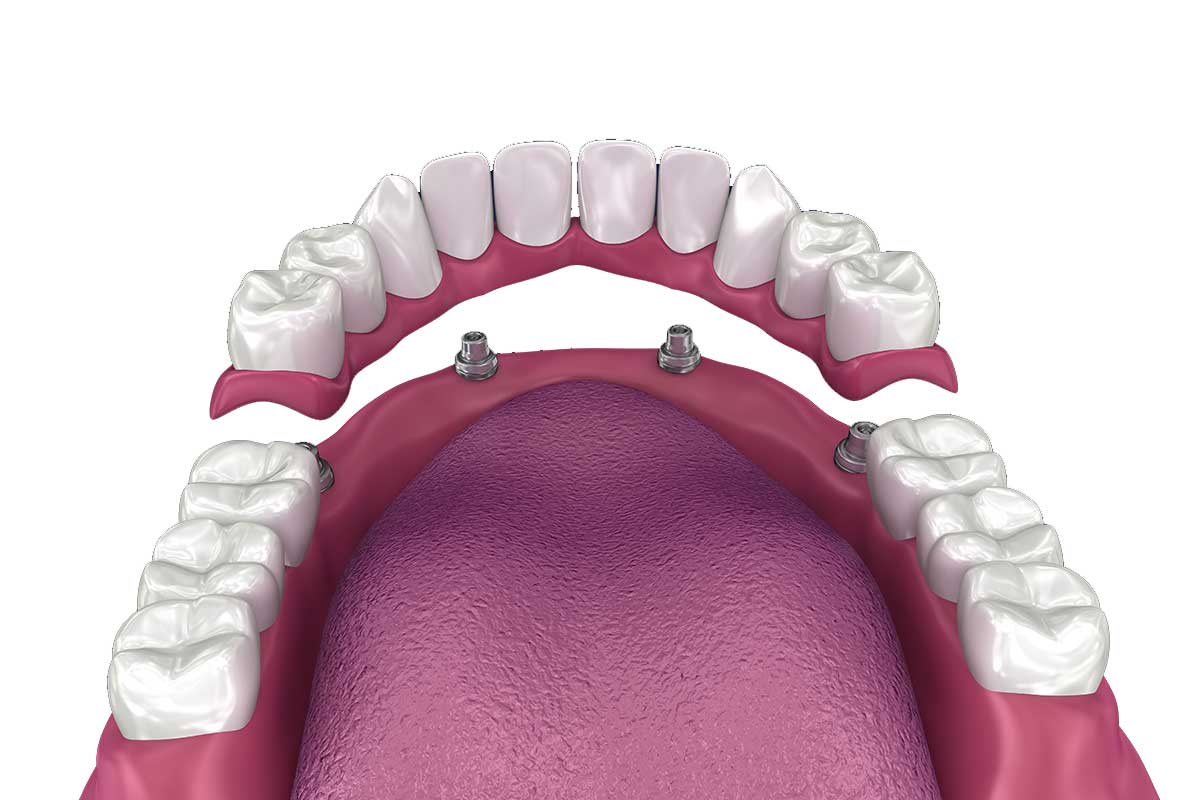
Full mouth dental implants, also known as full arch dental implants or implant-supported full mouth restorations, involve the placement of dental implants to support a full set of artificial teeth to replace an entire arch (upper or lower) or both arches of missing teeth. This comprehensive tooth replacement solution is designed for individuals who have lost most of their teeth in one or both jaws.
The procedure typically involves strategically placing multiple dental implants, often four to six implants, in the jawbone. These implants serve as anchors or abutments for a custom-made prosthetic bridge or denture that spans the entire arch. The bridge or denture is securely attached to the implants, providing stability, function, and aesthetics similar to natural teeth.
Full mouth dental implant treatment is a complex and multi-step process that requires careful planning and coordination between the patient, dentist, and dental lab.
How long do dental implants last?
With proper care and maintenance, dental implants can last a lifetime. Dental implants are designed to be a long-term solution for tooth replacement, and many individuals have enjoyed the benefits of their implants for decades. However, it’s important to note that the lifespan of dental implants can vary depending on several factors, like a patient’s level of oral hygiene and maintenance, their overall health and lifestyle habits, and if they bite or grind their teeth.
Are dental implants painful?
Patients typically do not experience pain during the dental implant procedure due to using local anesthesia or other sedation techniques to ensure comfort. These numbing agents block pain signals, allowing the implant surgery without discomfort. Many patients report feeling pressure or vibrations during the procedure but no pain.
After the dental implant surgery, some discomfort or soreness is common, but the pain level varies among individuals. Patients may experience mild to moderate discomfort, swelling, and bruising in the days following the procedure. This can be managed effectively with over-the-counter pain medications, as the dental professional recommends.
As with most dental procedures, the level of pain or discomfort experienced can depend on several factors, including the complexity of the procedure, the individual’s pain tolerance, and their ability to follow post-operative care instructions.
Most patients find any discomfort experienced during the dental implant process manageable and temporary. The long-term benefits and improved oral function achieved through dental implants often outweigh the temporary discomfort associated with the procedure. Communication with your dental professional is essential to ensure that your concerns are addressed and appropriate pain management strategies, such as sedation dentistry, are implemented to ensure a comfortable experience.
Are dental implants safe?
Dental implants are considered safe for the body when performed by a skilled dental professional and when the patient is suitable for the procedure. Dental implants have been extensively researched, developed, and used in clinical practice for several decades with a high success rate and patient satisfaction.
The major reasons why dental implants are considered safe are because they are made of biocompatible materials, are prime candidates for osteointegration, and there is a long-standing track record of success if a dental implant professional conducts the procedure.
Are dental implants the best option to replace teeth?

Dental implants are typically considered the best option to replace missing teeth, from looks to functionality to convenience. The procedure is more expensive and time-consuming but the results are worth it for several reasons:
1. Improved stability
Dental implants as anchors ensure a secure and stable foundation for the full arch restoration. This eliminates concerns about dentures slipping, shifting, or falling out while speaking or eating.
2. Enhanced chewing function
The stability provided by full mouth dental implants allows for improved chewing efficiency, enabling individuals to enjoy a wider range of foods confidently.
3. Restored facial aesthetics
Full arch dental implants help preserve the natural jaw shape and facial structure, preventing the sunken appearance that can occur with extensive tooth loss. This results in a more youthful and appealing facial appearance.
4. Increased comfort
Implant-supported full arch restorations eliminate the discomfort and irritation often associated with traditional dentures. The implants provide a secure and comfortable fit, eliminating sore spots and gum irritation.
5. Long-term solution
Full mouth dental implants offer a long-lasting tooth replacement option with proper care and maintenance. Unlike traditional dentures, which may require frequent adjustments or replacements, implant-supported restorations can last for many years or even a lifetime.
Dental implants at Martindale Dental
If you’re looking for dental implants in Hamilton, then our offices can help. Our dentists and oral surgeons are experienced implant specialists ready to assess your situation and get you started on the path back to amazing oral health and a beautiful smile. Get in touch with our office here, or drop by the dental implant clinic location nearest you at any time.
Check us out on Facebook and Twitter for daily information about Oral Health from Martindale Dental, or visit our offices in Hamilton and St. Catharines.
Have more questions?
Please contact us for all inquiries or to book an appointment with one of our convenient clinic locations. We look forward to hearing from you.


